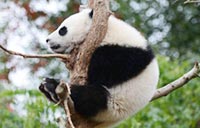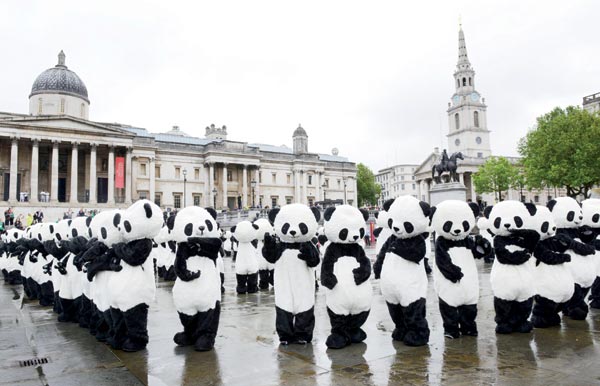Black-and-white star power
By Erik Nilsson ( China Daily ) Updated: 2014-04-01 07:27:37
 |
| Panda visit wows Obama family on last day of tour |
 |
| Panda cubs at Chengdu Research Base in SW China |
Yet the animals have served as channels of China's soft power since dynastic times. The first recorded instance arrived when Tang Dynasty Empress Wu Zetian (AD 625-705) sent a pair to Japan's emperor.
Perhaps the most celebrated modern moment of so-called panda diplomacy came when Zhou Enlai offered former US first lady Pat Nixon a pair after her husband's ice-breaking 1972 visit.
She'd enjoyed seeing the creatures at the Beijing Zoo and pointed out the animal's image on a pack of cigarettes sitting on the table. (Deng Xiaoping was known for his preference for Panda brand smokes.)
Zhou offered her a pair of the bears. The US had previously arranged to send a couple of musk oxen before Nixon's trip.
"The (Nixon) administration believed the rare North American musk oxen would be unique to the zoos of China and would elicit great appreciation and interest among the Chinese people," the Richard Nixon Foundation's communications director Jonathan Movroydis says.
The animals were sent, But the musk oxen caused considerably less fervor in China than the pandas ignited at the Smithsonian's National Zoological Park. About 1 million people lined up for about 45 minutes to see the Chinese species in the first weeks in the country.
"Panda diplomacy is a lasting symbol of President and Mrs Nixon's historic trip to China in 1972 and the goodwill showed in what was the beginning of Sino-American relations after decades of non-communication," Movroydis says.
"Forty-two years on, we have only seen the friendship blossom and our bonds strengthen. The continuation of panda diplomacy embodies that spirit ... Since (China's) opening, the panda has come to symbolize China's arrival to the world stage as a great contributing member to the family of nations."
The situation metamorphosed in the mid-1980s, when China began leasing pandas to zoos, rather than giving them to countries. Zoos typically pay $1 million a year for 10-year leases and agree any cubs born abroad belong to China.
Merchandizing and ticketing generally make the investments worthwhile.
|
|
|
|
|
|
|
|






















 Raymond Zhou:
Raymond Zhou: Pauline D Loh:
Pauline D Loh: Hot Pot
Hot Pot Eco China
Eco China China Dream
China Dream China Face
China Face





